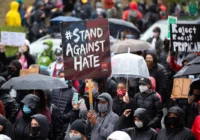India can no longer be a junior partner to the US — New Delhi and Washington must stand on an equal footing.
A recent Washington Post op-ed by Narendra Modi and Barack Obama was the culmination of the Indian prime minister’s successful visit to the US. The quasi-diplomatic document — as ambivalent as diplomatic statements are — was symbolic of the thawing of relations between the two nations. Ties between India and the US, which reached its zenith during the US-India Civilian Nuclear Agreement in 2008, sank into an abyss during a stand-off emanating from the Devyani Khobragade affair in 2013, when the Indian diplomat was charged by American officials for visa fraud.
Despite differences between the US and India over a number of issues pertaining to trade, civilian nuclear energy and terrorism, “Chalein saath-saath” (forward together we go) is an attempt to restore diplomatic normalcy. While the US has reasons to feel disappointed over the outcome of the Civilian Nuclear Agreement, especially the nuclear liability issue, India views Washington’s sincerity in confronting terrorism with suspicion.
India has been appalled by continued US military and economic support to Pakistan, despite obtaining evidence of Islamabad’s involvement in destabilizing the region. Pakistan is perhaps the only country in the world that pursues terrorism as an instrument of state policy. The US has repeatedly turned a blind eye, even to Pakistani-sponsored terrorists bleeding US forces in Afghanistan. The Haqqani Network would be ineffectual without the backing of Pakistan’s Inter-Services Intelligence (ISI). US support for Pakistan has not diminished, despite Pakistani deceit that allowed Osama bin Laden to take refuge in Abbottabad. Washington’s tacit support of the Pakistani theory of “good terrorist, bad terrorist” has created the trust deficit with India.
The denial of a US visa to Modi during his tenure as chief minister of Gujarat, due to his alleged involvement in anti-Muslim riots in 2002, was expected to create embarrassment for the Obama administration during the prime minister’s recent visit. It was a classic case of hypocrisy by the US that laid the red carpet for Gen. Pervez Musharraf — who overthrew a democratically elected government in Pakistan — while refusing to extend diplomatic courtesy to a democratically elected Indian leader.
Inherited Flaws in Foreign Policy
Foreign policy was expected to be Modi’s Achilles heel, due to his limited experience in central government and provincial background. His political opponents had repeatedly focused on this inexperience during the campaign for the general elections.
A recent Washington Post op-ed by Narendra Modi and Barack Obama was the culmination of the Indian prime minister’s successful visit to the US. The quasi-diplomatic document — as ambivalent as diplomatic statements are — was symbolic of the thawing of relations between the two nations.
Modi inherited a foreign policy which, like other policies in India, had been captive to the idiosyncrasies of the Nehru-Gandhi dynasty assisted by a sycophantic bureaucracy. Jawaharlal Nehru, the first Indian prime minister, remained a slave to his utopian “Panchsheel” (five principles of peaceful coexistence) while China annexed Tibet. Tibet had been a strategic buffer for India since time immemorial. The military defeat against the Chinese in 1962 was a natural corollary. During the Cold War, India’s obsession with the Non-Aligned Movement (NAM) was an exercise in vanity. NAM epitomized hypocrisy, with its members firmly entrenched with the US or Soviet camps, while propagating the virtues of non-alignment. India itself was compelled to obtain military support from the Soviet Union to counter US assistance to Pakistan.
An International Statesman
Modi’s initiatives in the US, however, belie his purported inexperience in foreign policy. If his public pronouncements are anything to go by, Indian foreign policy could undergo radical changes under his leadership. The prime minister utilized his address to the United Nations General Assembly to portray India as an alternative power that could provide leadership to countries aggrieved with US efforts to create a unipolar world, Russian President Vladimir Putin’s bullying tactics, and rising Chinese imperial ambitions concealed behind the façade of communism.
The prime minister, who had taken the initiative by inviting heads of state of South Asian countries to his inauguration ceremony, used the UN General Assembly to build bridges with neighbors such as Nepal and Bhutan, by acknowledging their contribution to stability in the region. It was in stark contrast to the government of former Indian Prime Minister Manmohan Singh, when relations with neighboring nations turned cold. Indian diplomacy in countries like Nepal had ensured that New Delhi was viewed with suspicion. This further resulted in increasing Chinese influence in the region. By reaching out to smaller neighbors, Modi allayed their fears. His diplomatic initiative is certain to disrupt China’s effort to strategically surround India — initially through its economy and then militarily.
Modi’s call to include regional actors in the US-led coalition of nations being established to fight the Islamic State (IS), a jihadist group that has seized portions of Syria and Iraq, was a message to Washington regarding its flawed policy of isolating nations even in the fight against terrorism. Without alluding to any specific country, Modi unambiguously indicated that he shared the concerns of the Iranian and Syrian governments. Although the impact of IS has not yet been felt in India, it is in New Delhi’s strategic interest that it starts building its defense against this macabre ideology. Modi has initiated this policy by raising concerns over the futility of battle against IS by secluding major players in the region because of US intransigence.
He also did an admirable job by defusing the rhetoric emanating from Nawaz Sharif, the Pakistani prime minister, who utilized the UN General Assembly to raise the Kashmir issue. Modi was statesmanlike in his refusal to counter Sharif’s vituperative statement and by categorically asserting that terror and talks cannot proceed together. By deliberately avoiding a slanging confrontation with his counterpart, the Indian prime minister did not allow Sharif the opportunity to placate his domestic audience about taking on India over Kashmir.
New Delhi has been a major contributor to reconstruction efforts in Afghanistan during the post-Taliban period. Pakistan has protested against India’s involvement in Afghanistan because of its apprehensions over New Delhi gaining a foothold in its backyard.
Even Modi’s loyalists have been surprised by the deftness with which he combined India’s muscular approach in safeguarding its territorial integrity with “soft power,” which focuses on business rather than war. Perhaps realizing the fact that India needs economic growth to feed its people, Modi emphasized utilizing the Indian market as an instrument of foreign policy. In a break from the past, he assiduously tried to portray India as a nation that was comfortable in its role as a technological superpower, instead of a country that only propagates itself as an ancient culture.
Modi’s critics, who were caustic about his inexperience in foreign policy, failed to acknowledge the prime minister’s success in developing close ties based on business opportunities with the Chinese leadership and Shinzo Abe, the Japanese prime minister, during his tenure as chief minister of Gujarat.
India’s Concern in Afghanistan
The prime minister also made an important correction in India’s Afghanistan policy during discussions with President Obama. India’s historical relations with Afghanistan suffered during Taliban rule. The demolition of the Buddhas of Bamiyan by the Taliban epitomized their antipathy toward India.
New Delhi has been a major contributor to reconstruction efforts in Afghanistan during the post-Taliban period. Pakistan has protested against India’s involvement in Afghanistan because of its apprehensions over New Delhi gaining a foothold in its backyard. Indian consulates in Afghanistan have been the target of Pakistan-sponsored terror attacks, in order to deter India’s involvement in the country.
However, as Singh’s government struggled for political survival, Afghanistan gradually slipped off India’s policy radar. The impending withdrawal of NATO forces from Afghanistan, combined with political uncertainty, has allowed the Taliban to launch major offensives and regain large areas of the country. The US urgency to withdraw its troops and engage in surreptitious negotiations with the Taliban has only served to embolden the terrorist organization.
The retreat of US forces from Afghanistan has serious ramifications for India. With the continued Pakistani policy of “bleeding India through a thousand cuts,” a hasty retreat of US soldiers will allow Pakistan to withdraw forces from its border with Afghanistan and shift them to the boundary with India. History is testimony to the fact that an increased Pakistani army presence on the Indian border only serves to facilitate the infiltration of terrorists.
Ayman al-Zawahiri’s declaration of jihad on India — by al-Qaeda’s new Indian branch — has increased concern of the Indian establishment. With terror activities in Jammu and Kashmir gradually being brought under control, any infusion of foreign fighters under the aegis of al-Qaeda will only exacerbate the security situation in the state.
Therefore, Modi’s effort to raise Indian concerns with Obama was a step in the right direction. India cannot remain a mute spectator while the US shifts its policy in Afghanistan. The implications of a failed state are too grave for Indian strategic interests. India might need to develop a coalition of nations to deal with a failed Afghanistan and an ascendant Taliban. Modi was pragmatic in his effort to reach out to Iran during his General Assembly speech.
India can no longer be a junior partner to the US. The spirit of “Chalein saath-saath” requires both India and the US to be equal partners. The US needs to address Indian concerns, while deciding on the fate of Afghanistan and Washington’s support for Pakistan. Modi’s pragmatism, detached from the burdens of the past, suggests Indian foreign policy could finally gravitate toward realpolitik. In a country encumbered by a legacy of Panchsheel and NAM, that itself would be an achievement.
The views expressed in this article are the author’s own and do not necessarily reflect Fair Observer’s editorial policy.
Support Fair Observer
We rely on your support for our independence, diversity and quality.
For more than 10 years, Fair Observer has been free, fair and independent. No billionaire owns us, no advertisers control us. We are a reader-supported nonprofit. Unlike many other publications, we keep our content free for readers regardless of where they live or whether they can afford to pay. We have no paywalls and no ads.
In the post-truth era of fake news, echo chambers and filter bubbles, we publish a plurality of perspectives from around the world. Anyone can publish with us, but everyone goes through a rigorous editorial process. So, you get fact-checked, well-reasoned content instead of noise.
We publish 2,500+ voices from 90+ countries. We also conduct education and training programs
on subjects ranging from digital media and journalism to writing and critical thinking. This
doesn’t come cheap. Servers, editors, trainers and web developers cost
money.
Please consider supporting us on a regular basis as a recurring donor or a
sustaining member.
Will you support FO’s journalism?
We rely on your support for our independence, diversity and quality.







Comment